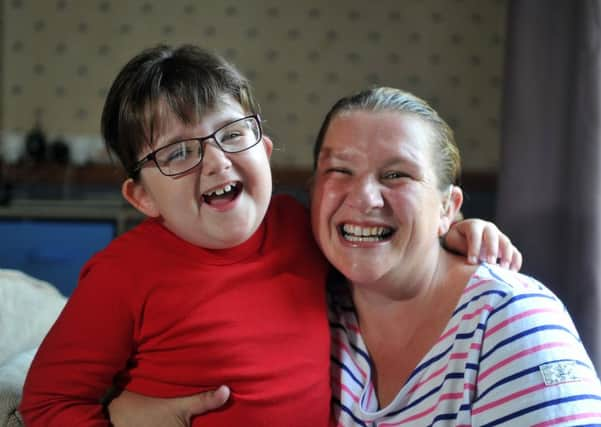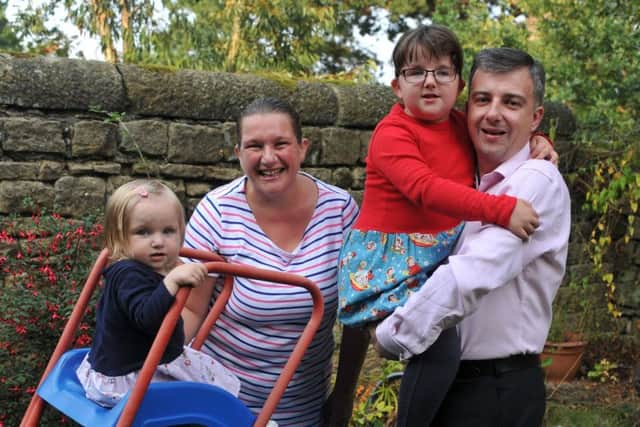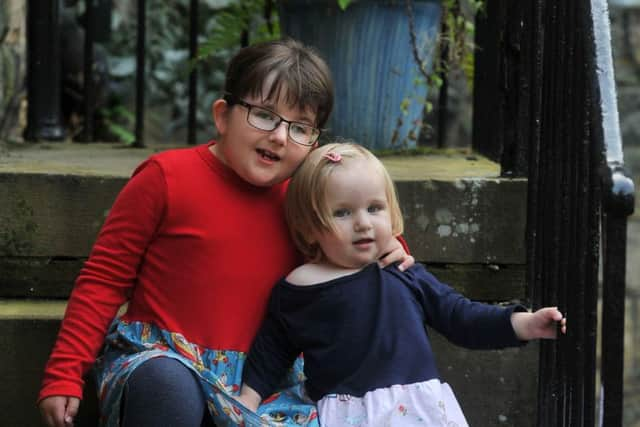Little sister helps Evie, 6, say '˜mummy' for the first time


When Evie Swales was born two things were noticeable to her parents Lindsay and John. The first was that Evie was small, weighing 6lb 9oz, despite being ten days overdue. The second was that she had an extra toe.
“We thought nothing of it,” says Lindsay, 37, from Ilkley. “I’d had a normal delivery, after being induced. During the pregnancy I had polyhydramnios, which is excess amniotic fluid and one ultrasound picked up that Evie had an enlarged kidney.
Advertisement
Hide AdAdvertisement
Hide Ad“She had another kidney scan at three-days-old and it was all normal. Nothing else was amiss with Evie, but we now know that an extra toe, and polyhydramnios, are diagnostic markers for the genetic disorder Bardet-Biedl syndrome (BBS).”


As Evie developed she was a really good baby. However, started to worry that she was behind in reaching the milestones like rolling, crawling, walking and talking. She started to walk around 18 months. She was a very chubby baby. She also had a squint and was referred to an eye hospital where they picked up she was short-sighted, which is unusual in a young baby.
“It was in July 2012, when Evie was two, that a consultant first mentioned BBS. It was a huge shock. I just thought she was a bit behind other children and would catch up. Genetically it was a worry as my husband John and I had just started to try for a second baby so we had to put that on hold. “
Lindsay made the mistake of researching the condition on the Internet.
Advertisement
Hide AdAdvertisement
Hide Ad“There are so many horror stories out there, but we have never heard of BBS and it wasn’t that easy to find information, especially anything that would give us hope.


“We stumbled across a high mortality rate, which we were just shocked at. We thought, ‘no not our baby’. It was heart-breaking.”
Bardet-Biedl syndrome (BBS) is a rare inherited condition. It is characterised by vision loss, obesity, additional fingers and/or toes, undeveloped genitals, learning difficulties, kidney dysfunction and a range of endocrine problems.
Geneticists have identified 19 genes known to cause Bardet-Biedl syndrome. The family saw a geneticist in November 2012 at Bradford Royal Infirmary, who agreed it was probable Evie had BBS. Lindsay had already arranged to take Evie to the specialist clinic at Great Ormond Street Hospital.
Advertisement
Hide AdAdvertisement
Hide AdIn March 2013, a few weeks after her third birthday, Evie was seen at GOSH. She had eye examinations and was diagnosed with the eye condition rod cone dystrophy, another marker of BBS. The genetic test later came back positive for BBS1, the most common form of the genetic disorder.


Lindsay and John, who works in IT, had a tough decision to take in planning for a second child, as they have a one in four chance of having another child affected by the disorder. The couple had already postponed trying for a baby whilst Evie was going through the diagnosis.
“We had come to the heart-breaking decision not to have another child because there was a one in four chance the baby was BBS. Fate however intervened, and once I found out I was pregnant we decided to have screening as we had to know. I had a CVS test at around 11/12 weeks pregnant. We got the results a week later that all was fine.”
Libby was born, healthy, in January 2015. She does not have BBS, although she could be a carrier and can choose to be tested when she is an adult and thinking of planning a family. Evie meanwhile is a very happy little girl. She loves playing with her sister, who in turn it helping Evie’s development.
Advertisement
Hide AdAdvertisement
Hide Ad“She was never able to say Mummy and always called me Mamma,” says Lindsay. “Then when Libby started to talk and called me Mummy. A couple of days later Evie called me Mummy for the first time in six years. It was a very emotional moment.”


Despite her difficulties Evie is at mainstream school and has just gone into year 2. She has a statement of education need (SEN)
“She has started to read and write but she doesn’t run around like a normal six-year-old. She still babbles a lot, is hard to understand and she does sometimes get frustrated. But she is wonderful and just adores her little sister.
Evie also has night blindness. Last August she was introduced to a white cane the family have named ‘Bob’, in preparation for the dark winter afternoons. Evie also can’t see well in bright sunlight.
Advertisement
Hide AdAdvertisement
Hide Ad“She practises with Bob every morning and has never asked what Bob is for. She has no idea at all that she is any different.”
Evie is at the top of the weight chart, which is common with BBS. She likes her food but doesn’t have an insatiable appetite unlike some children with the condition. Lindsay has managed to keep her weight stable so she has come down on the Body Mass Index.
“We encourage healthy eating but Evie likes to eat on her terms. Last year she refused to eat fruit but she will now try a wider variety of foods including carrots, raisins and bananas. Evie would choose a biscuit rather than a packet of raisins.”
Evie’s family have had support from the charity Bardet-Biedl Syndrome UK which will this year receive a grant from Jeans for Genes to fund two booklets explaining the condition.
“The booklets are a really good idea,” says Lindsay. “It would be a fantastic resource for newly diagnosed families in particular as it is so overwhelming when your child is first diagnosed.”